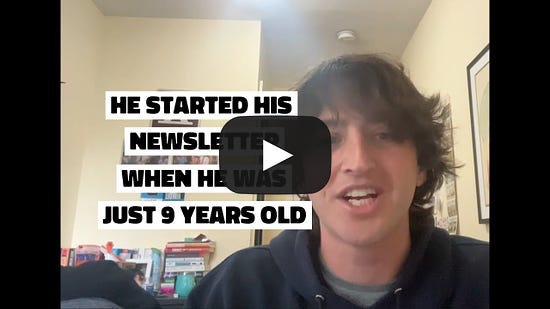AI-generated slop is already clogging the arteries of the web
AI-generated slop is already clogging the arteries of the webPLUS: Will Spotify's audiobook streaming be good for authors?Welcome! I'm Simon Owens and this is my media industry newsletter. If you've received it, then you either subscribed or someone forwarded it to you. If you fit into the latter camp and want to subscribe, then you can click on this handy little button: Let’s jump into it… AI-generated slop is already clogging the arteries of the webAsk any content creator or media executive what worries them about the rise of generative AI, and almost all of them will cite its potential to replicate their content and siphon away their audience. These anxieties have sparked countless debates about the parameters of copyright protection, and they’ve led to dozens of lawsuits against companies that vacuum up web content to train their LLMs. The most high profile of these lawsuits came from The New York Times in December. It accused OpenAI of “unlawful copying and use of The Times’s uniquely valuable work” so that it could use it “without payment to create products that substitute for The Times and steal audiences away from it.” But while these concerns are legitimate, much of the harm against publishers is still hypothetical, in that most haven’t seen a measurable hit to their business that can be attributable to the existence of AI chatbots. All you have to do is look at the NYT’s most recent quarterly earnings report to understand that it’s still growing unhindered. We haven’t seen the same kind of revenue fallout that followed the rise of, say, Napster, which very quickly began eating into music labels’ profit margins. Meanwhile, I think there’s a much more pressing problem whereby AI is already starting to degrade the entire user experience of the web, rendering once-reliable content resources as completely useless. This is a problem that’s currently causing web users harm while simultaneously destroying the utility of the world’s largest tech platforms. To understand the risk here, it’s helpful to look back at the pre-Google internet — an era when there were nearly a half dozen search engines vying for users’ attention. At the time, search engines like Yahoo, Lycos, AskJeeves, and AltaVista didn’t have very effective methods for indexing and sorting the web. Their ranking algorithms were fairly rudimentary; for instance, they placed significant weight on the number of times a particular keyword was used on a web page. As a result, search results were easily gamed and therefore useless. I’m speaking from experience here; I remember trying to conduct research on them for school projects and being frustrated when they returned absolute drivel. They were so bad that a company called Dogpile gained significant audience share for its sole function of aggregating results from multiple search engines — the idea being that no search engine by itself was up to the task of surfacing what you wanted. We all know what happened next: Larry Page and Sergey Brin invented Pagerank, a much more elegant algorithm for ranking web content, and as a result Google captured nearly all the search engine market share. Within a year or two, web users began to trust search engines to serve up (mostly) relevant results. Flash forward to today, and that trust is quickly eroding — not just for Google, but also all sorts of tech platforms that service billions of users. The first victim was Amazon’s book store, likely because it provides the easiest way for AI-aided scammers to generate revenue from their work. As Wired reported in September, its search results have been flooded with AI-generated knock-offs, mostly in reference categories like travel and how-to:
I’ve seen multiple comments from social media users who said they accidentally ordered these books from Amazon, and in each case they immediately were able to tell that the book was written by AI. Despite these bad customer experiences, Amazon told Wired it has no current plans to scan for and identify AI-generated books. Then there’s Google News, which, as 404 Media reports, is indexing sloppy, AI-generated rewrites of already existing news articles:
It’s worth pausing for a moment to note the significance of this. Google News has strict parameters for what it allows into its index and requires new publishers to fill out an application to join. The parameters are so tight that I haven’t even bothered to submit my own newsletter, despite the potential upside of being indexed. And what is that upside? Well, in addition to showing up in Google News search, articles are often displayed in a special “top stories” module at the very top of search results. They’re also featured within the mobile home page when over a billion Android and iOS users open their Chrome apps. It’s clear that websites indexed by Google News are given much more authority and prominence throughout all of its apps. I’ve worked at media companies that regularly received traffic windfalls of tens of thousands of visits in a few hours just because a story ranked well in Google News. And despite the importance of Google News in our information ecosystem, a Google spokesperson confirmed to 404 Media that it has no current plans to identify and label AI-generated content in search results. Finally we have the wide proliferation of scammy ads that are displayed across millions of websites, social media platforms, and video portals via programmatic ad tech. This allows AI-generated, misleading slop to appear even on legitimate news sites:
Again, it’s not hyperbolic to conclude that this content is already generating real-world harm, potentially against hundreds of thousands of web users. Despite this huge problem, I’ve yet to come across an ad tech platform that’s developing ways to detect and eliminate this fakery. In fact, many ad tech vendors merely brag about how brands can leverage AI in their campaigns. Right now, we’re still in the first phase of this AI-generated internet dystopia. For the most part, billions of users are still trusting these platforms to deliver high quality information. But remember the examples of the pre-Google search engines; as consumers continue to get burned by AI-generated slop, it’ll trigger a growing distrust of the platforms’ ability to aggregate and serve up trustworthy information. The cynics reading this will respond by saying they gave up trusting the big tech platforms long ago, but while those platforms certainly have a checkered history of content moderation, I think those mistakes will pale in comparison to what’s coming if they don’t do a better job of detecting and filtering AI-generated content. This isn’t a hypothetical harm that’s still a few years off in the distance; this slop is already clogging the arteries of the web, and it’s quickly going to get worse. What do you think?
How Gabe Fleisher built Wake Up To Politics, a daily newsletter with over 50,000 subscribersThere are plenty of popular politics newsletters out there, but none with the kind of unique origin story of Wake Up to Politics. It was started by Gabe Fleisher when he was only 9 years old. While the early editions were sent out by a Gmail account and only read by his mom, Gabe kept at it, waking up early every day before school to write the newsletter. Flash forward about a decade, and he’s now a senior at Georgetown and Wake Up to Politics has close to 50,000 subscribers. In my interview with Gabe, we talked about what kept him motivated all these years, how he monetizes the newsletter, and what he plans to do with it once he graduates. Watch our interview in the video embedded below:  If video embeds don’t work in your inbox, go here. If you want to listen to an audio version of this interview, subscribe to The Business of Content wherever you get your podcasts: [Apple] [Spotify] [Amazon Music] I’m looking for more media entrepreneurs to feature on my newsletter and podcastOne of the things I really pride myself on is that I don’t just focus this newsletter on covering the handful of mainstream media companies that every other industry outlet features. Instead, I go the extra mile to find and interview media entrepreneurs who have been quietly killing it behind the scenes. In most cases, the operators I feature have completely bootstrapped their outlets. In that vein, I’m looking for even more entrepreneurs to feature. Specifically, I’m looking for people succeeding in these areas:
Interested in speaking to me? You can find my contact info over here. (please don’t simply hit reply to this newsletter because that’ll go to a different email address. ) Will Spotify's audiobook streaming be good for authors?It’s been nearly five years since Spotify announced it would diversify its audio offerings beyond music streaming, and while it spent most of that time building its podcast capabilities, it made no secret that it eventually wanted to get into audiobooks. Then in 2022 it made its first move into the industry by acquiring an audiobooks distributor called Findaway. Later that year, it launched the ability to purchase audiobooks through Spotify. And then finally in late 2023 it rolled out audiobook streaming as part of its paid subscription. There’s one group that’s watched these developments closely: audiobook authors. They’re understandably nervous about how Spotify’s bundled offering will affect their own income, and many are deeply skeptical of the company’s intentions. So will Spotify’s audiobook streaming be good for authors? That’s a question I put to Jane Friedman, the writer behind the publishing industry newsletter The Hot Sheet. She walked me through the current landscape of digital audiobook sales and explained how Spotify’s revenue sharing arrangement works. Watch our discussion in the video embedded below:  If video embeds don’t work in your inbox, go here. If you want to listen to an audio version of this interview, subscribe to The Business of Content wherever you get your podcasts: [Apple] [Spotify] [Amazon Music] Quick hitsI have a hard time believing Hollywood can just consolidate its way out of its current predicament. More acquisitions will just mean these companies are bogged down with more debt. Most of them have great offerings, they just need to focus on doing the hard work of improving their customer acquisition process, generating more revenue per user, and decreasing churn. [Variety] Not long ago, there was some hopeful optimism that a handful of tech billionaires could bring some fresh thinking to the challenge of properly monetizing news content, but they're just as flummoxed as everyone else on how to revitalize legacy media outlets. [NYT] INTERESTING: LinkedIn is launching a way for you to email gate your content within LinkedIn. Basically you can publish an article on LinkedIn and then insert a "unlock article" that forces them to input their email address before they can access the full thing. [Social Media Today] "Over a full fiscal year, The Guardian received roughly $30 million in revenue from reader donations in the U.S. and Canada. About a third of all digital reader revenue across The Guardian now comes from the United States." [Nieman Lab] The headline's a little hyperbolic, but I do agree that allowing writers to sell one-off information products like ebooks and courses could be a big opportunity for Substack. [Storyletter] Want to pick my brain on your content strategy?Are you contemplating a new content strategy and want someone to give you feedback? I’ve had more and more of my readers reach out and request consulting calls so they can pick my brain on a variety of issues including platform optimization, content strategy, and monetization. You can now book a call with me directly through Substack. Use the link below to grab a time on my calendar:
Want a daily dose of media industry news?I only send this newsletter out twice a week, but I curate industry news on a daily basis. Follow me on one of these social platforms if you want your daily fix: You're currently a free subscriber to Simon Owens's Media Newsletter. For the full experience, upgrade your subscription. |
Older messages
So much media consumption isn't real
Wednesday, January 17, 2024
PLUS: Literary fiction's death is greatly exaggerated
Why print magazines endure
Friday, January 12, 2024
PLUS: How Madison Avenue fueled the rise of programmatic ad tech
The biggest difference between the Creator Economy and traditional media
Friday, January 12, 2024
Welcome! I'm Simon Owens and this is my media industry newsletter. If you've received it, then you either subscribed or someone forwarded it to you. If you fit into the latter camp and want to
How publishers should respond to declining Google traffic
Wednesday, January 10, 2024
PLUS: Another Substack writer joins the $1 million club
The Messenger didn't learn the media lessons of the 2010s
Friday, January 5, 2024
PLUS: Private equity backlash is fueling a local news resurgence
You Might Also Like
AI chatbots keep failing every accuracy test thrown at them
Wednesday, March 12, 2025
PLUS: Why Substack's new subscriber milestone is so significant ͏ ͏ ͏ ͏ ͏ ͏ ͏ ͏ ͏ ͏ ͏ ͏ ͏ ͏ ͏ ͏ ͏ ͏ ͏ ͏ ͏ ͏ ͏ ͏ ͏ ͏ ͏ ͏ ͏ ͏ ͏ ͏ ͏ ͏ ͏ ͏ ͏ ͏ ͏ ͏ ͏ ͏ ͏ ͏ ͏ ͏ ͏ ͏ ͏ ͏ ͏ ͏ ͏ ͏ ͏ ͏ ͏ ͏ ͏ ͏ ͏ ͏ ͏ ͏ ͏ ͏ ͏
Everything We’ve Written About That’s on Sale at Nordstrom
Wednesday, March 12, 2025
Plus: Actually cute plus-size maternity clothes. The Strategist Every product is independently selected by editors. If you buy something through our links, New York may earn an affiliate commission.
What A Day: Bad Car-ma
Tuesday, March 11, 2025
Elon Musk's politics are sparking a major Tesla backlash, ironically thanks to Trump. ͏ ͏ ͏ ͏ ͏ ͏ ͏ ͏ ͏ ͏ ͏ ͏ ͏ ͏ ͏ ͏ ͏ ͏ ͏ ͏ ͏ ͏ ͏ ͏ ͏ ͏ ͏ ͏ ͏ ͏ ͏ ͏ ͏ ͏ ͏ ͏ ͏ ͏ ͏ ͏ ͏ ͏ ͏ ͏ ͏ ͏ ͏ ͏ ͏ ͏ ͏ ͏ ͏ ͏ ͏ ͏
Rohingya refugees just lost half of their food aid. Now what?
Tuesday, March 11, 2025
An interview with Free Rohingya Coalition what happened last week in Asia, Africa and the Americas Hey, this is Sham Jaff, a freelance journalist focused on Asia, Africa and the Americas and your very
Shayne Coplan’s Big Bet Is Paying Off
Tuesday, March 11, 2025
March 11, 2025 THE MONEY GAME Shayne Coplan's Big Bet Is Paying Off By Jen Wieczner Photo: Dina Litovsky At 6 am on Wednesday, November 13, eight FBI agents in black windbreakers burst through the
We need your input.
Tuesday, March 11, 2025
Share your insights & receive a 70% off forever.
We Talkin’ About Practice?
Tuesday, March 11, 2025
Nobody Told Me There'd Be Days Like These ͏ ͏ ͏ ͏ ͏ ͏ ͏ ͏ ͏ ͏ ͏ ͏ ͏ ͏ ͏ ͏ ͏ ͏ ͏ ͏ ͏ ͏ ͏ ͏ ͏ ͏ ͏ ͏ ͏ ͏ ͏ ͏ ͏ ͏ ͏ ͏ ͏ ͏ ͏ ͏ ͏ ͏ ͏ ͏ ͏ ͏ ͏ ͏ ͏ ͏ ͏ ͏ ͏ ͏ ͏ ͏ ͏ ͏ ͏ ͏ ͏ ͏ ͏ ͏ ͏ ͏ ͏ ͏ ͏ ͏ ͏ ͏ ͏ ͏ ͏ ͏ ͏ ͏
Seattle startup takes eco-friendly aim at recycling clothing
Tuesday, March 11, 2025
Read AI rolls out enterprise search tool | Hard time for hardware ADVERTISEMENT GeekWire SPONSOR MESSAGE: A limited number of table sponsorships are available at the 2025 GeekWire Awards: Secure your
☕ The beauty of it all
Tuesday, March 11, 2025
A conversation with Ulta Beauty's CMO. March 11, 2025 View Online | Sign Up Marketing Brew Presented By Iterable It's Tuesday. Count Kathy Hochul as an ad buyer. The governor of New York is
🤔 What’s in your wallet? A scam.
Tuesday, March 11, 2025
Plus, a new streaming deal is the latest gift to Trump from the billionaire CEO and his company — which profits off government contracts. Forward this email to others so they can sign up 🔥 Today on
